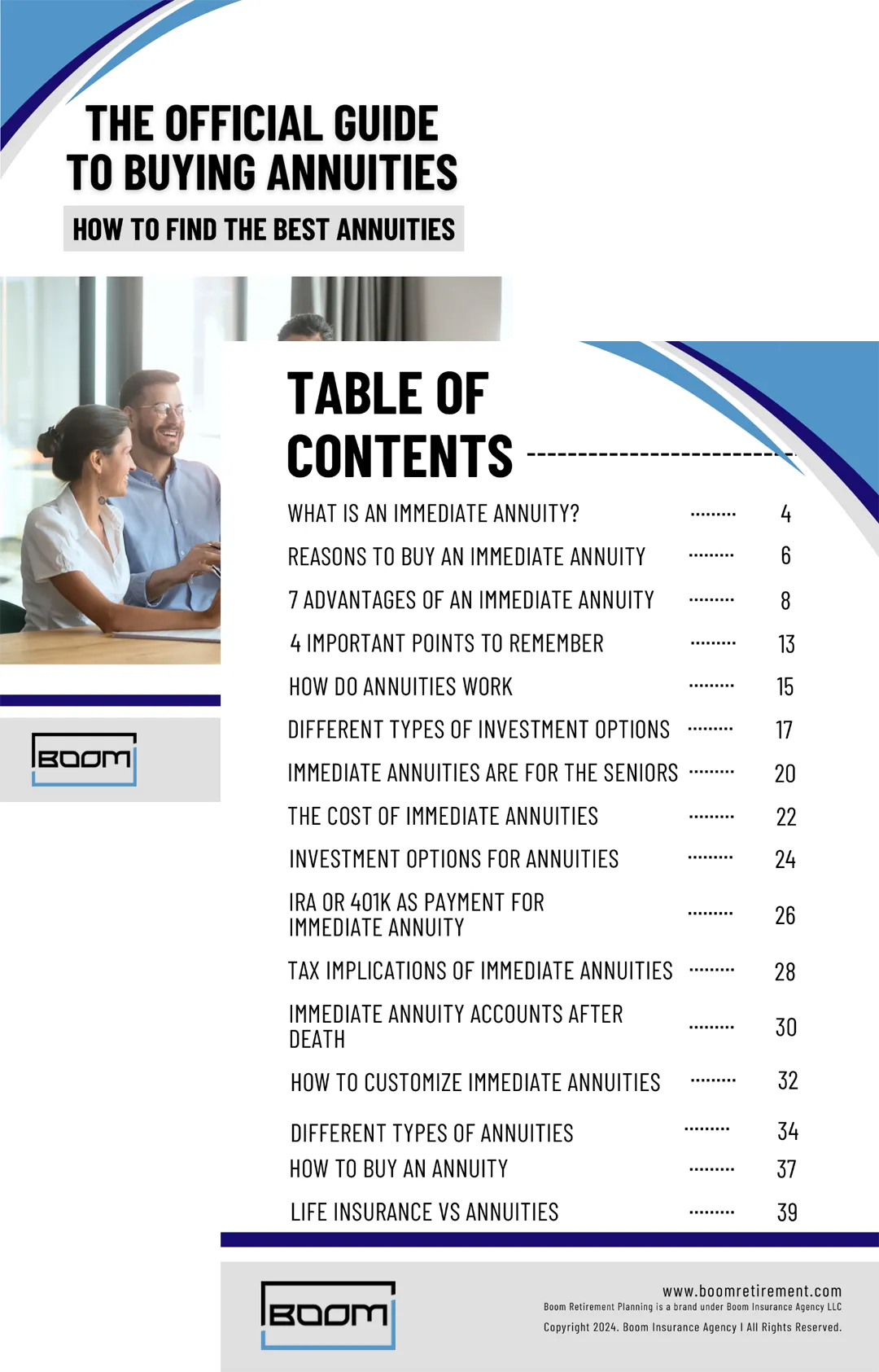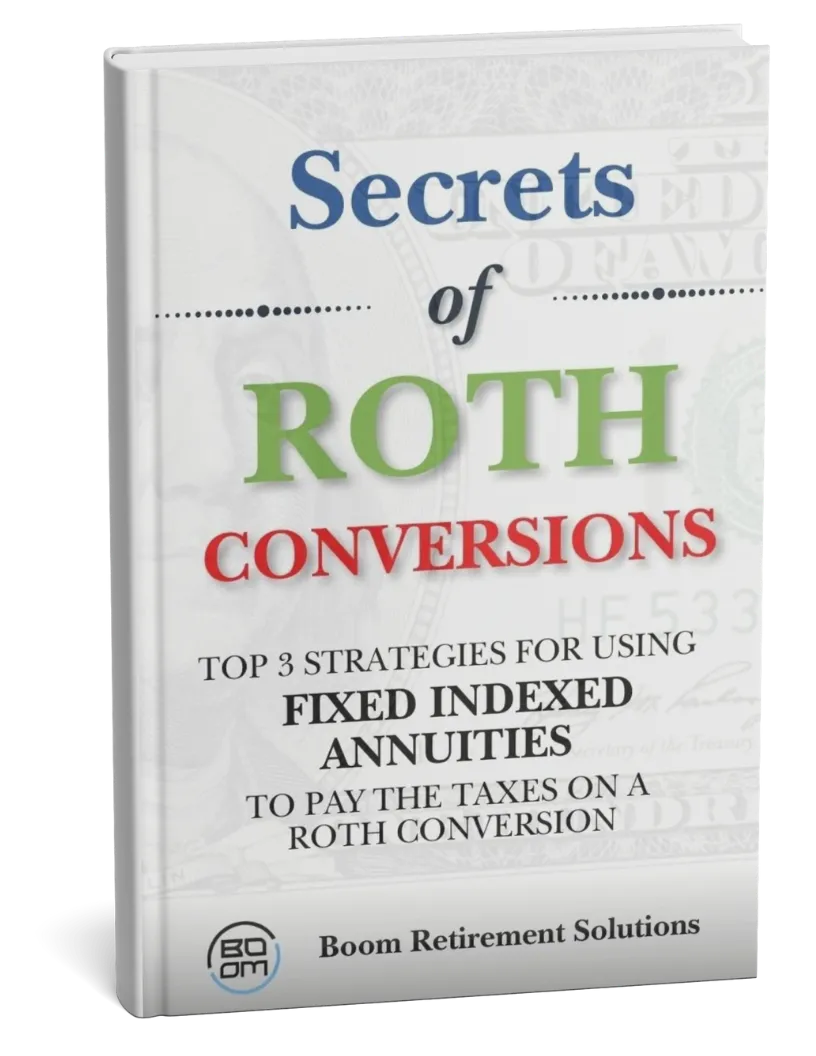
BOOM RETIREMENT SOLUTIONS
Strategies for Boosting Retirement Income

Top Retirement Cash Flow Risks
Why you need this Retirement Toolkit
Will outlive your retirement savings?
Will taxes and inflation erode your Retirement Nest Egg?
Will you head into retirement using an Accumulation Strategy or a Decumulation Strategy?
Will you maintain your lifestyle in a market downturn?
Are you prepared for RMD's and IRMAA?
BOOM RETIREMENT PLANNING
Strategies for Boosting Retirement Income
If You Ask 50 Financial Advisors,
"What is the best way to retire?".
You will get 50 different answers!
That is because despite all their training and certifications,
financial advisors each bring their own perspectives, experiences, and
biases to the table, leading to varied approaches and strategies tailored to their
unique understanding of the market, client needs, and risk tolerance.
Economic Science and Math proves...
There is Only One Optimal Way to Retire
Over 6 Decades of Research Created the 7 Steps Below.
Develop a Plan: Assess your financial situation, retirement goals, income sources and monthly budget for expenses.
Secure Lifetime Income: Consider products like private pensions for guaranteed income.
Maximize Social Security: Optimize benefits by understanding your options; delaying to 67 or 70 can help.
Diversify Investments: Build a balanced portfolio—30% cash value life insurance, 30% lifetime income, 40% growth assets.
Prepare for Health Care Costs: Budget for health expenses, including long-term care, which most seniors will need.
Use Tax-Efficient Strategies: Consider Roth conversions to reduce retirement taxes.
Stay Active and Engaged: Pursue activities for mental, physical, and emotional well-being in retirement.
Our Blog

Annuities: Essential Building Blocks for Your Retirement Plan
Annuities: Essential Building Blocks for Your Retirement Plan
By Jeff Weidner
Navigating the Modern Retirement Landscape
Retirement today is a lot different than it was for our parents and grandparents. Gone are the days when defined benefit plans provided a guaranteed income for life. Now, many of us are responsible for building our own retirement savings, which can feel overwhelming. But don’t worry—there are tools to help you create a secure financial future, and one of the most reliable is an annuity.
What is an Annuity?
An annuity is a contract between you and an insurance company. You pay the insurance company a sum of money, either all at once or over time, and in return, they agree to provide you with regular income payments, starting either immediately or at a future date. Think of it as a personal pension that you set up for yourself!
Types of Annuities
Understanding the different types of annuities can help you choose the right one for your retirement needs. Here’s a breakdown of the most common options:
Immediate vs. Deferred Annuities
Immediate Annuities
Immediate annuities start paying out almost as soon as you purchase them. They’re perfect for those who’ve reached retirement age and want to convert their savings into a steady income stream right away.
Deferred Annuities
Deferred annuities delay payments until a future date. During the accumulation phase, you make contributions, and during the distribution phase, you start receiving payments. This type is ideal if you want to grow your savings tax-deferred before tapping into them during retirement.
Fixed vs. Variable Annuities
Fixed Annuities
Fixed annuities offer a guaranteed interest rate, similar to a Certificate of Deposit (CD). They’re considered safe and conservative, providing predictable income in retirement. However, they might not keep up with inflation, and their returns can be lower compared to other investments.
Variable Annuities
Variable annuities invest your money in sub-accounts that hold stocks, bonds, or other securities. This means your earnings can fluctuate based on market performance. They offer higher growth potential but come with increased risk, as payments are not guaranteed and can vary.
Fixed Indexed Annuities
Fixed indexed annuities combine elements of both fixed and variable annuities. They offer a minimum guaranteed rate while also allowing your returns to increase based on the performance of a specific market index, such as the S&P 500. This provides some growth potential with a level of protection for your principal.
Why Consider Annuities for Retirement?
Annuities offer several unique benefits that can enhance your retirement strategy:
1. Guaranteed Lifetime Income
One of the biggest worries in retirement is outliving your savings. Annuities with lifetime income options provide a guaranteed stream of income that you can’t outlive, ensuring financial independence as you age.
2. Tax-Deferred Growth
Like traditional retirement accounts (401(k)s and IRAs), annuities offer tax-deferred growth. This means you won’t pay taxes on your earnings until you start making withdrawals, allowing your money to grow faster over time.
3. Supplementing Social Security and Pensions
While Social Security provides a foundational income, it might not cover all your expenses. Annuities can supplement Social Security benefits and any pensions you have, creating a more complete and reliable income stream during retirement.
FAQs About Annuities
Here are answers to some of the most frequently asked questions about annuities to help you make informed decisions for your retirement.
What are the different types of annuities?
Annuities come in various forms, including:
Immediate Annuities: Start paying out almost immediately after purchase.
Deferred Annuities: Payments begin at a later date.
Fixed Annuities: Offer a guaranteed interest rate.
Fixed Indexed Annuities: Combine fixed rates with growth potential based on a market index.
Variable Annuities: Invest in sub-accounts tied to the stock market.
How do annuities compare to CDs?
Annuities and CDs (Certificates of Deposit) are both savings options with guaranteed interest rates. However, annuities can offer guaranteed lifetime income, which CDs do not. Additionally, fixed annuities often provide better interest rates compared to CDs.
Are there tax benefits to owning an annuity?
Yes, annuities offer tax-deferred growth, meaning you don’t pay taxes on earnings until you start making withdrawals. This can be a valuable feature for long-term retirement planning.
Can I lose money in an annuity?
It depends on the type of annuity. Fixed and fixed indexed annuities generally protect your principal, while variable annuities carry the risk of loss since they’re tied to the stock market.
When is the best time to buy an annuity?
The best time to buy an annuity depends on your individual financial situation and retirement goals. Many people purchase annuities in their 50s or 60s as they approach retirement and seek a reliable income source.
What is an annuity rider?
An annuity rider is an optional add-on to your annuity contract that provides additional benefits or features, such as guaranteed minimum income or death benefit protection. However, riders often come with additional costs.
FAQs About Boom Retirement Solutions
Here are some common questions about Boom Retirement Solutions and how they can assist you with annuities.
Who is Boom Retirement Solutions?
Boom Retirement Solutions specializes in helping individuals create secure retirement plans through tax-advantaged products like annuities and other guaranteed income solutions. They provide personalized guidance to help clients make informed financial choices for a comfortable retirement.
How can Boom Retirement Solutions help with annuities?
Boom Retirement Solutions offers expert advice on selecting the right type of annuity based on your needs. They help you understand your options, weigh the benefits, and structure annuities to maximize income and minimize taxes.
What makes Boom Retirement Solutions unique?
Boom Retirement Solutions stands out for its personalized approach, focusing on creating a retirement plan that balances guaranteed income, tax advantages, and growth potential to suit each client’s unique goals.
Final Thoughts
Annuities can be a powerful tool in building a solid retirement strategy. They provide a predictable income stream, allow your savings to grow tax-deferred, and offer peace of mind knowing you have a source of income that you cannot outlive. However, it’s essential to understand the different types of annuities, weigh the pros and cons, and carefully consider your individual needs and goals.
Take Action Today
Deciding on the right annuity can significantly impact your retirement income. Consult with a qualified financial advisor to explore how an annuity can fit into your overall retirement plan. If you’re ready to dive deeper into the benefits of annuities, Boom Retirement Solutions can provide a tailored consultation to help you make informed decisions for your future.
Please note that this article is for informational purposes only and should not be considered financial advice. Be sure to consult with a licensed retirement specialist to determine the best retirement strategy for you.
Taxation can play a substantial role in determining
the overall value of your retirement portfolio
How are your current retirement income sources taxed?
Social Security
Qualified Accounts
Non-Qualified Accounts
Social Security is a federal government program in the United States that provides financial benefits to eligible individuals, primarily retirees, disabled individuals, and their families. It is funded through payroll taxes collected under the Federal Insurance Contributions Act (FICA) and the Self-Employment Contributions Act (SECA).
Key components of Social Security include:
Retirement Benefits: These benefits are available to workers who have paid into the Social Security system through payroll taxes during their working years. Individuals can start receiving reduced retirement benefits as early as age 62, but full benefits are available at the full retirement age, which varies depending on the year of birth. Delaying benefits beyond full retirement age can increase the monthly benefit amount.
Disability Benefits: Social Security Disability Insurance (SSDI) provides benefits to individuals who are unable to work due to a qualifying disability. To be eligible, individuals must have a sufficient work history and meet specific medical criteria.
Survivor Benefits: These benefits are paid to the surviving spouses, children, or dependents of deceased workers who paid into the Social Security system. The amount of the benefit depends on the deceased worker's earnings record.
Supplemental Security Income (SSI): Although administered by the Social Security Administration, SSI is a separate program funded by general tax revenues (not Social Security taxes). It provides financial assistance to elderly, blind, or disabled individuals with limited income and resources.
Social Security is a critical component of retirement planning for many Americans, providing a safety net to ensure a basic level of income in retirement, during periods of disability, or after the death of a family member.
Social Security benefits may be taxed based on your combined income, which includes adjusted gross income, nontaxable interest, and half of your Social Security benefits. Depending on your income level, up to 85% of your benefits could be subject to federal income tax.
A qualified account is a type of retirement savings account that offers tax advantages, typically regulated by the IRS under specific sections of the tax code. Contributions to qualified accounts are often tax-deferred, meaning that contributions are made with pre-tax dollars, reducing the individual's taxable income in the year of the contribution. Taxes on contributions and investment earnings are deferred until withdrawals are made, usually in retirement.
401(k) plans
403(b) plans
457 plans
Traditional IRAs
SEP IRAs
SIMPLE IRAs
Self Directed IRAs
Pensions
Annuities
Withdrawals from these accounts are generally subject to income tax, and there may be penalties for early withdrawals before a certain age (usually 59½). Additionally, qualified accounts are subject to Required Minimum Distributions (RMDs) once the account holder reaches age 73 (if born before 1960).
Required Minimum Distributions (RMDs) are the minimum amounts that retirees must withdraw annually from their tax-deferred retirement accounts, such as traditional IRAs and 401(k)s, starting at age 73 (as of 2023). The amount of the RMD is calculated based on the account balance and the account holder's life expectancy. Failing to take RMDs can result in significant tax penalties, including a hefty excise tax on the amount that should have been withdrawn.
A non-qualified account is a type of investment account that does not have the same tax advantages or restrictions as qualified retirement accounts. Unlike qualified accounts, contributions to non-qualified accounts are made with after-tax dollars, meaning there's no tax deduction for contributions.
Examples of non-qualified accounts include:
Brokerage accounts
Mutual fund accounts
Certificates of deposit
Savings accounts
Roth IRA
Cash Value Life Insurance
Annuities
These accounts are often used for general savings and investments outside of retirement, offering more flexibility in terms of contributions and withdrawals, but without the tax advantages of qualified accounts.
The exception is the Roth IRA in which the principal, interest, earnings and dividends are all tax-free. Roth IRAs are also not subject to RMD's.
A Roth conversion is the process of transferring funds from a Qualified retirement accounts into a Roth IRA (Non-Qualified Account). The converted amount is subject to income tax in the year of the conversion, but future withdrawals from the Roth IRA are tax-free, provided certain conditions are met. This strategy is often used to reduce taxable income in retirement and to avoid required minimum distributions (RMDs).
Books for Retirees and Soon-To-Bes
Choose Your Book
Roth conversions


transitioning


Retirement Income


Tax Strategies




Long Term Care



Boom Final Expense is a brand under Boom Insurance Agency LLC
©Copyright 2023| Boom Insurance Agency. All Right Reserved

Boom Retirement Planning is a brand under Boom Insurance Agency LLC
©Copyright 2024| Boom Insurance Agency. All Right Reserved





